
PDXCON 2021 Overview
Paradox revealed some exciting news for a lucky few, myself included, during PDXCON 2021, on 12th May. Excited to see what announcements would be made, I brewed some pretty mediocre coffee and donned my fully-charged headset, ready to go!
Bringing us this digital conference this year was host, Jesse Henning. First, he described what to expect, and I will do the same for you.
- Empire Of Sin: Make It Count DLC - Brenda Romero, Game Director, gives us the low down in the new expansion, Make It Count.
- Crusader Kings III: Royal Court Expansion - Alexander Oltner, recently appointed Game Director earlier this year, describes what to expect and how to show off your Kingliness!
- Prison Architect: Second Chances - Adrian Dugue and Curtis Wicks tag team the third segment with a scoop on Prison Architect: Second Chances. In this fifth installment of DLC for the game, the reform system has been expanded and completed with a rehabilitation process directly inspired from real life prisons.
- Victoria III! (FOR REAL) - Yes. You read that correctly. Some of you out there already made some guesses (or prayers!) that this would be the day in which the third installation of the series would come to pass. Well, it has!
So without further ado, let’s dive in!
Empire Of Sin: Make It Count DLC
“Alotta booze, alotta bullets” is how Game Director, Brenda Romero, described Empire of Sin. However, while the Make it Count DLC maintains its gangster profile, we are promised “a whole new level of strategy” as well.
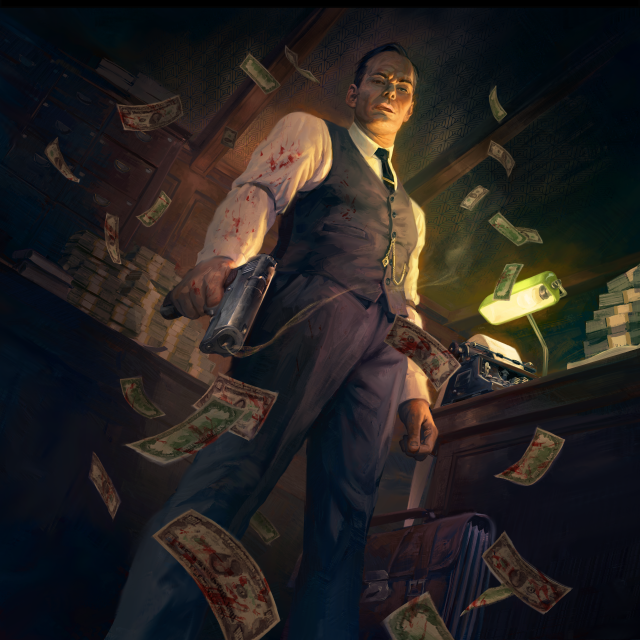
The trailer showed us Meyer Lansky, a new boss to accompany the DLC. Historically, Lansky was a famous accountant associated with the Jewish mob, as well as gambling federations around the world. Romero stated that gameplay around Lansky will resonate with his financial ventures, and this strategic playstyle ties very nicely into another of the DLC features, Precincts.
Precincts will allow players to “paint the map”, cutting out your empire into sections to better manage your assets. This isn’t just a result of wanting additional bells and whistles in the game either. Romero explained that they invested a huge amount of time into gaining customer feedback to pinpoint areas of improvement for the player. The results seem promising. Make It Count will also bring a significant level of interface changes to better manage your empire! Optimised panels, the mapping for Precincts, as well as better scaling and balancing for the AI, culminate towards better quality of life throughout.
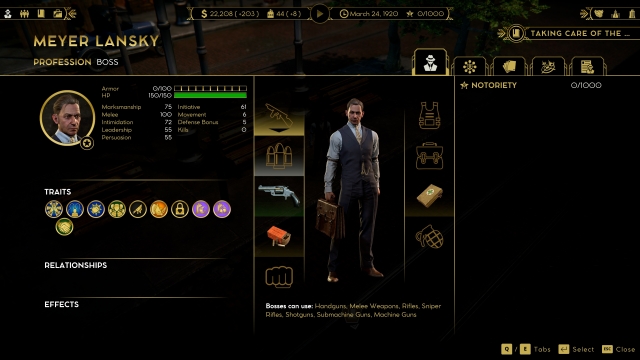
Romero lastly announced that alongside all this content, there will be a new ‘Chi town mogul’ empire path to victory, law enforcement improvements, and phase one of modding! There is promise of more modding in further DLCs too. Romero remarked that the team understands the desire for mods in games, mixing up the playstyle in a way catered to each individual, showing yet again the dedication to tailoring a game’s updates and improvements to the voices of the fans.
After all that Empire Of Sin talk it was time for Crusader Kings III: Royal Court Expansion!
Crusader Kings III: Royal Court Expansion
Alexander Oltner explained that the aim with the Crusader Kings III: Royal Court Expansion is to provide players with a new hub to display “the fruits of their success”. You can retire old weapons and shields as family heirlooms and assign vassals to new positions in court, such as a food taster, Court Tutor, and even a Royal Champion! However, Royal Court is far more than just aesthetics or granting office. Players must demonstrate and emphasise ‘Grandeur’, spending their riches and essentially showing off their kingliness! By doing so, they gain respect and assert power. Something that was expected of a King, historically.
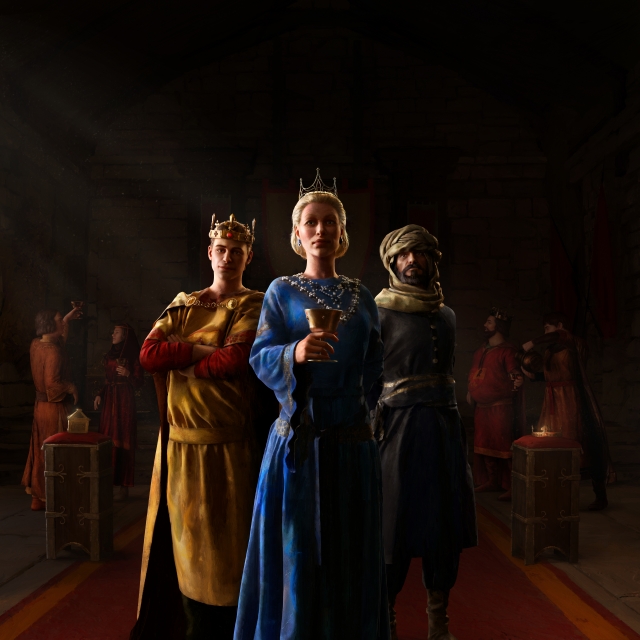
Furthermore, Oltner explained that this is not just for you as the majesty of your realm, but a hub for a player to receive riches and patronage from their vassals, and is a “glorious bridge between map and character.” Players will be able to hold ‘Court Actions’, inviting vassals to submit and pay homage and inspired characters may be drawn to your empire, if you are deemed a noteworthy King! These inspired people can set off to perform great feats on your behalf, furthering your grandeur or bringing valuable items for your character. It seems very much a give-and-take style approach in which you will build grandeur through spending and acting kingly. The more you do, the more others will be attracted to your reign and the more opportunity you will have for rewards.
Additionally, a new cultural interface will be free alongside the update consisting of four major groups: Western style, Middle-Eastern style, Indian style, and Mediterranean style. The aim here is to make the cultural side of the gameplay more interactive for the player, Oltner said. A significant portion of this will include deciding on which cultural path your empire will take - Cultural Divergence. Dynamic attitudes between different cultures mean that your actions can affect your people, or other peoples, significantly. For example, you will be able to abolish traditions and “adapt to a new way of life”, leading your people towards a different cultural attitude. Be careful when doing so, some of the pop (population) may not agree and it will potentially form drastic and long-term changes for your people.
Another exciting avenue for players is to work towards two different cultures not having any penalties towards each other - a more open-minded approach to rule! From what was said here, it seems very diverse offering a good amount of replay value. At the end of the discussion, Olterner was asked if petitioners could request assassination attempts during Court Actions, to which he replied, rather sheepishly: “Well… Maybe…”
Prison Architect: Second Chances
Then, Adrian Dugue and Curtis Wicks walked us through some of the features in Second Chances, Prison Architect’s fifth installment of DLC to date. Everything in this iteration will be focused on rehabilitation for the prisoners as well as better interface for the players.
How can we teach our murderers to be better? Work experience! Convicts can gain new skills from work activities such as waiting tables, cooking grub in the kitchens, or taking a quieter approach in the library. Every successful reintegration to society will award players a bonus of $1000. Failures will fine players heavily, a whopping $5000! But the goal at the end of the day is to NOT send the convicted off to do more crime, and this certainly will incentivise players to achieve better-behaved prisoners. We were assured that, despite the difference in money over successful reintegration and repeat offenders, player actions have a much bigger impact than passive traits or characteristics that lead to higher chances of reoffending. The reformation program also affects all convicts in the program meaning you will not always have to monitor the prisoners one by one.
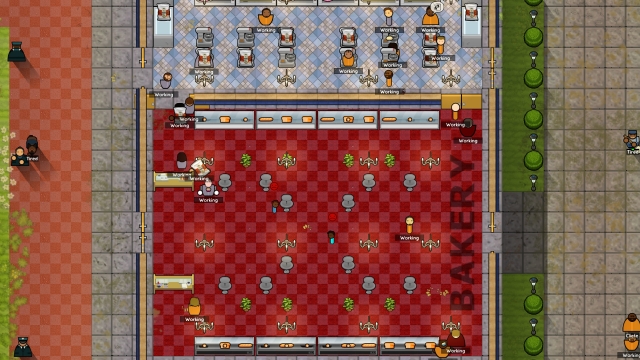
As I mentioned in the overview, a huge amount of what we will see in this DLC has been researched and based upon different prisons. A bakery, restaurant, as well as animal therapy are all takes on real prison reforming programs. Animal therapy allows prisoners to pet a canine friend, reducing their stress levels, giving a ‘buff’ essentially, that lessens chances of bad behaviour and reduces certain needs. It also leads to better mental health for the convict. Definitely the best part of the DLC in my opinion! Further therapy is also available, with a prisoner consultation, and a conflict resolution program, showing convicts how to resolve conflicts without using violence.
Finally, they detailed how the work experience is not just a present time fix, but also a tool to further better the prisoner’s life when they are reintegrated into society. Wicks explained that in taking on work experience, the prisoners will gain skills in that area of work. Upon taking to society once again, the inmate can get a job more easily, and this will further reduce the chances of reoffending. To monitor the chances of this, the interface has been optimised, showing details on each prisoner. Players can simply click on the prisoner on the panel to reveal all stats (they can even customise the colours of the prisoner outfits too).
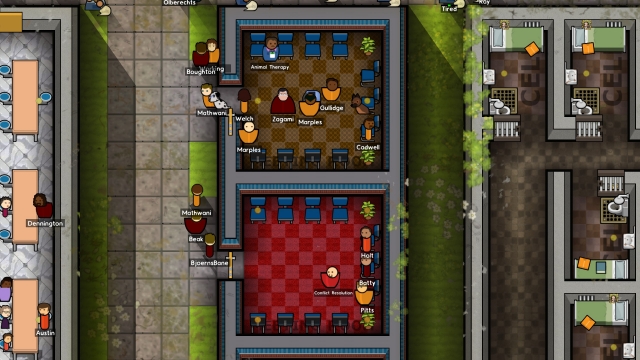
Finally, and this was the BIG one… Oh yes, for those wondering and waiting (I know that many of you were) we received confirmation for Victoria III.
Victoria III
Lead game designer, Mikael Andersson, and Game Director, Martin Anward, gave us a rundown alongside actual gameplay as Prussia, in the gorgeous-looking Victoria III reveal. Note: they were both wearing ‘Victoria III confirmed’ T-shirts!
So for those wondering why the hype is palpable, Victoria II was released in 2010 and is vastly revered as one of Paradox’s best games to date, despite its age. Paradox fans across Twitter, and other social media pipelines, blew up recently after CEO, Ebba Ljungerud, revealed the intention to announce a new game during PDXCON. It was all mere speculation, but the fans have been answered with exactly what was at the tip of their tongue!
Anward began with an overview of the game. Victoria III will be a grand strategy game spanning between 1836-1936, right off the cuffs of the industrial revolution. Within the game’s century, each day will be divided into separate chunks to provide a lengthier game than its predecessors, he continued. Anward also revealed that players will get the option to play over 100 of the countries in the game, “significantly more than 100, I would even wager to say…”. If these first impressions are anything to go by, Victoria III will keep you strapped to your chair for a good long while!
One of the biggest differences in this iteration to the series is that the economy is focused on many local markets, with roughly 50 trade goods, as opposed to one global economy. Anward further explained this by listing several countries, all intertwined within Prussia’s local market due to their ties with the customs union at the time. The level of detail and historical accuracy is admirable, and well thought out.
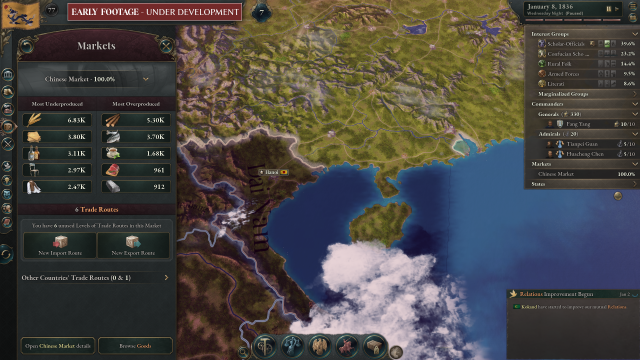
For those familiar with grand strategy games, you will know that pop is a very important factor in your gameplay. Victoria III is no different. However, there are additions worth noting. Firstly, the entire world’s pop is monitored during play. “Everything you do will affect your pops and in turn they affect your country back.” The law system, for example, consisted of three different groups: Power Structure, Economy, Human Rights. Active laws are displayed in clear view, and not only can players change laws, but whether or not such changes would be approved or disapproved by political groups in power are displayed when hovering over each law available. Education is key to whether or not they will be able to learn how to operate in the workplace, and could be the key to a successful business, or a bad one. A peasant would not have the same level of education as the majority of the capitalist pop, for example, and so the latter would be better suited as engineers.
Furthermore, wealth and wages are incredibly important. Rather a number players will distribute and never see again, it accounts for the pop’s taxes, their needs outside of the workplace, and this can vary depending on the quality of life that pop leads too. It must be monitored and nurtured accordingly. Essentially, if the pop is a fancy pants, expenses will be more due to their luxury consumption being higher than that of a peasant.
While none of this is final, the gameplay looks beautiful. I’m talking lovely textures on the map, to a really clean and easy-to-navigate interface. With such an in-depth strategy game, it is easy to get lost, especially for newer players. But I must say, each tangent of a core system had clear and self-explanatory headings.
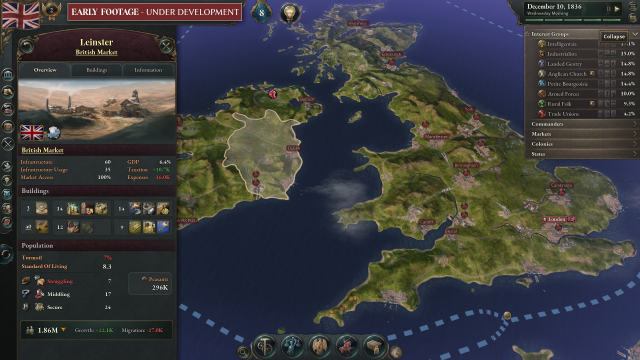
Many of us asked about how close the visuals were to being finalised but, of course, it is too early to say. It seemed, however, a great start!
So, what about politics? Primary Interest Groups (Primary IG) are factions, all countries have them, and there will be roughly eight available. They each serve different interests with a sharp focus on their own ideologies. Leaders can change, and these groups can apply pressure to you, and you them, depending on how much “political clout %” the group may have, and leaders may also have ideologies of their own. These factions will push their ideologies and utilise their political clout via the pops, influencing them, sharing their ideas and views. For example, industrialists follow an individualist ideology, favouring private solutions rather than public. If the player adopts a pension system this group will be paying a great deal for this, and so it could cause discord towards them. A major part of the political game here is empowering the interest groups that will support your ideologies, enabling you to build the society you wish to create. This will make it easier to pass laws, and to pass them without rebuttal.
There will also be institutions: “entities in a country that have become ingrained in it over time.”, Miguel stated. Some are services provided to the general pop, while others focus on country-wide services, such as colonial affairs, or a national security agency. Benefits from these services are dependent on your bureaucracy level, and you can have different kinds of services running at the same time. A private education system will provide higher wealth but that isn’t to say all schools would need to follow suit across the country. Religious schools will help more with religious conversion, obviously.
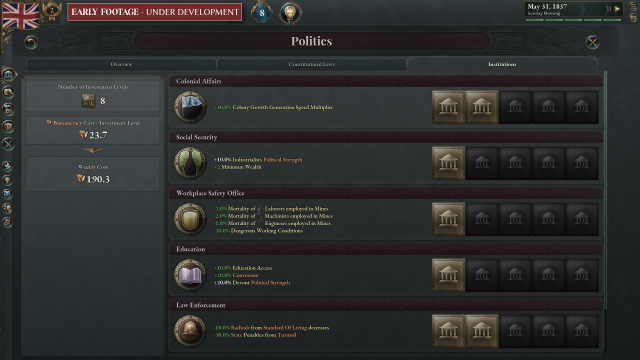
Following on from that, Miguel gave us a breakdown of bureaucracy, the organisations that establish services based on principal values, continuity and function. Players have a great deal of choice here, too. You can opt to run a “slim state” if you provide no institutions and have low taxes, or you can “go like Prussia”, donning a police state with a heavy investment into your organisations. These seem to be influenced by the laws that a player is using at the time. Different laws will reduce or emphasise the effects each service has. Interest groups come back into play here, in that while they might not have a direct interest in the service being provided, they may have thoughts about how it is run. The education system is another good example. An industrialist would approve more of a private schooling system as opposed to a tax-funded one. Bureaucracy, as well as two other capacities; Authority and Influence, are generated for players to confer long-term changes to the country. Bureaucracy is influenced by the institutions formed, Authority by laws, and Influence by power rank. Influence can allow you to form more diplomatic pacts which will be very handy when heading into diplomacy discussions...
Let’s take a look at the diplomacy panel. We were shown two major areas here, diplomatic actions and diplomatic plays. Anward described how the diplomatic actions “represent your relations to other countries, your agreements with other countries, and how two countries align towards each other.” Do you have trade agreements to facilitate goods? Are you on friendly terms with this country? If so, do you wish to form an alliance?
Diplomatic plays, on the other hand, are used when… You want to snag a bit of land, or a big bit of land! Players will be able to demand for open markets from another country, ‘make puppet’ of another, and more. He went on to say that this play screen is heavily inspired by Victoria II: Heart Of Darkness. In Victoria III, this has been further embellished with a heavy focus on negotiations in diplomatic plays. If you do wish to expand, initiating plays will allow you to bully countries, strategically stripping away their power by means other than all out war. Anward made it a point to say that war does happen, of course. However, the idea is to give players as many options as possible in getting what they want, before taking up arms. Your level of power will dictate how many plays you can make in negotiation also. Make a proposal, hear the response, adjust, push, settle, depending on how you are feeling. Push it too far, however, and other countries will possibly react in kind!
The final stages of the presentation saw both Anward and Andersson taking on a barrage of questions from the present press but that is the full gist of it folks! Are you looking forward to any of these games? Comment below on what you hope to see in the new title!








COMMENTS